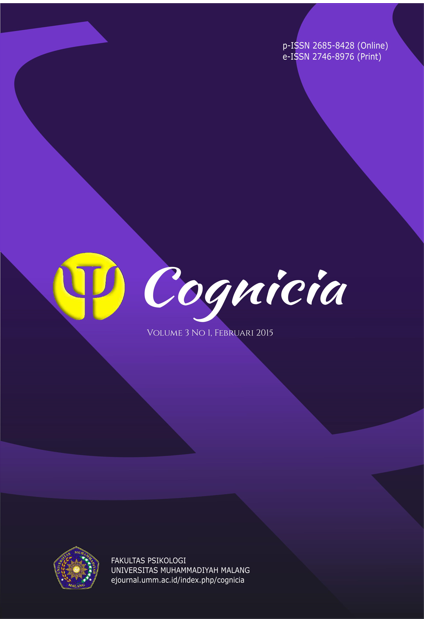Dukungan Sosial dengan Culture Shock Pada Mahasiswa
DOI:
https://doi.org/10.22219/cognicia.v3i1.2320Abstract
Universitas Muhammadiyah Malang memiliki mahasiswa dari berbagai budaya diantaranya berasal dari Sumatera, Kalimantan, Bali, NTB, NTT, Sulawesi dan Papua. Kemungkinan, dalam proses akulturasi mahasiswa yang berasal dari luar Jawa ada yang mengalami kesulitan untuk beradaptasi dan tidak ada yang mengalami kesulitan dalam beradaptasi. Istilah yang digunakan untuk menyebut individu yang mengalami kesulitan untuk beradaptasi adalah culture shock. Salah satu unsur untuk mengurangi tingkat culture shock yaitu dengan dukungan sosial. Tujuan dari penelitian ini adalah untuk mengetahui hubungan dukungan sosial dengan culture shock yang dialami oleh mahasiswa baru Fakultas Psikologi UMM. Penelitian ini menggunakan skala dukungan sosial dan skala culture shock dengan model skala likert. Jumlah subjek sebanyak 103 mahasiswa yang berasal dari luar Jawa. Hasil penelitian menunjukkan bahwa ada hubungan negatif antara dukungan sosial dengan culture shock pada mahasiswa luar Jawa di Fakultas Psikologi UMM yang dibuktikan dengan hasil perhitungan korelasi product moment. Semakin tinggi dukungan sosial yang didapatkan maka semakin rendah tingkat culture shock yang dialami (r = -0.370 ;p = 0.000; p = 0 < 0.01 ).
Kata kunci: Dukungan sosial, culture shock, mahasiswa, luar Jawa
University of Muhammadiyah Malang have a students from different cultures which are from Sumatera, Kalimantan, Bali, NTB, NTT, Sulawesi and Papua. Possibility, in the process of acculturation a students are come from outside of Java there are having difficulty to adapt and experiencing no difficulties in adapting. The term used to explain individuals are have difficulty to adapt is culture shock. One element to reduce the rate of culture shock is the social support. The purpose of this study was of social support relationships with the culture shock experienced by new students of the Faculty of Psychology, University of Muhammadiyah Malang. This study used a questionnaire and social support for overseas culture shock questionnaire with Likert scale modesl. The number of subjects as many as 103 students from outside of Java. The results showed that there is a negative relationship between social support with culture shock on foreign students at the Faculty of Psychology UMM Java as evidenced by the results of the calculation of the product moment correlation. The higher the social support obtained, the lower level of culture shock experienced (r = -0.370 ;p = 0.000; p = 0 < 0.01 ).
Keywords : social support, culture shock, students, outside java
Downloads
Downloads
Published
How to Cite
Issue
Section
License
Copyright (c) 1970 Prisza Indra Susilo

This work is licensed under a Creative Commons Attribution-ShareAlike 4.0 International License.
Authors who publish with Jurnal Cognicia agree to the following terms:
- For all articles published in Jurnal Cognicia, copyright is retained by the authors. Authors give permission to the publisher to announce the work with conditions. When the manuscript is accepted for publication, the authors agree to automatic transfer of the publishing right to the publisher.
- Authors retain copyright and grant the journal right of first publication with the work simultaneously licensed under a Creative Commons Attribution-ShareAlike 4.0 International License that allows others to share the work with an acknowledgment of the work's authorship and initial publication in this journal.
- Authors are able to enter into separate, additional contractual arrangements for the non-exclusive distribution of the journal's published version of the work (e.g., post it to an institutional repository or publish it in a book), with an acknowledgment of its initial publication in this journal.
- Authors are permitted and encouraged to post their work online (e.g., in institutional repositories or on their website) prior to and during the submission process, as it can lead to productive exchanges, as well as earlier and greater citation of published wor (See The Effect of Open Access).

This work is licensed under a Creative Commons Attribution-ShareAlike 4.0 International License







